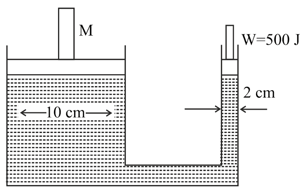Energy
Energy: Overview
This topic covers concepts, such as, Work-Energy Theorem, Potential Energy, Energy & Kinetic Energy etc.
Important Questions on Energy
Derive that mechanical energy is always constant in the case of a freely falling body.
An object of mass, is moving with a constant velocity, . How much work should be done on the object in order to bring the object to rest?
What is the difference between energy and work done?
A person does of work in climbing a tree of height . Calculate the mass of the person.
A body of mass is projected vertically up with the velocity of . If the energy spent in overcoming air resistance is , the maximum height attained by it is ()
Two bodies of the same mass have velocities in the ratio 2:3. The ratio of their kinetic energies will be
Define kinetic energy. Derive an expression for kinetic energy of a body of mass m moving with a velocity v.
What happens to the molecules when the ice starts to melt
The hydraulic press given in the figure is used to raise the mass M through a height of by performing of work at the small piston. The diameter of the large piston is , while that of the smaller one is . The mass M is:

If a bullet of mass moves with a velocity of . It penetrates into a target which is not moving and then comes to rest. Find the kinetic energy possessed by the bullet and also the average retarding force offered by the target.
What is gravitational potential energy? Derive its equation.
Assertion: If velocity of a moving body is increased to double, then its kinetic energy increases four times.
Reason: Kinetic energy is directly proportional to the square of velocity.
The explosion at Krakatoa is estimated to have released the energy equivalent to of TNT. The first nuclear detonation-the Trinity test -yielded an equivalent of of TNT. How many times more powerful was the explosion at Krakatoa?
A car travels along a flat road. It has of kinetic energy. Every second, air resistance and other frictional forces cause it to lose of energy. If the car is to travel at a constant speed, how much energy will the engine have to convert to kinetic energy every second?
A toy car has a kinetic energy of . It rolls up a slope and at the top it has of gravitational potential energy and of kinetic energy. How much energy has the car lost through friction?


